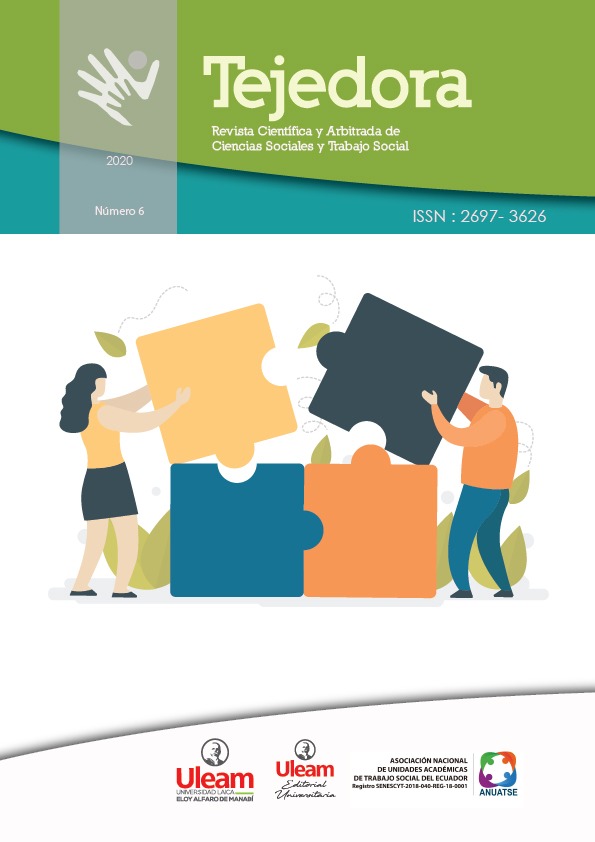PARENTAL DEVALUATION TO TE EDUCATIONAL PROCESS OF STUDENTS IN THE ZAMORA CHINCHIPE SCHOOL
DOI:
https://doi.org/10.56124/tj.v7i15ep.007Keywords:
parental devaluation, educational processAbstract
Parental devaluation implies an inability of parents to adequately consider their children and fulfill their parental roles effectively, which can have negative consequences for child development. The objective of this research was to analyze parental devaluation in the educational process, specifically in the Zamora Chinchipe school in the province of Carchi. We delved into the consequences that this problem causes in children, in addition to seeking the reasons and background of parental behavior to find alternatives. This research systematized the theoretical currents that cause parental devaluation, as well as the consequences of this type of affectations in the emotional, educational and physical growth of minors. Measures were proposed to improve communication between parents and children, as well as the involvement of teachers and parents in their educational growth. The methodology used was qualitative, through participant observation and focus groups, likewise the research was based on the humanistic paradigm, since it carried out a study of the human being in all its dimensions: cognitive, affective, social at the family level. It was concluded that parental valorization is fundamental for an adequate emotional growth of minors, seeking to create solid bases to maintain strong, lasting bonds between them with actions such as school for parents, literacy and psychological support
Downloads
References
Aizpuru Cruces, Monserrat Georgina (2018) La Persona como Eje Fundamental del Paradigma Humanista Acta Universitaria, vol. 18, núm. Esp, septiembre, , pp. 34 Universidad de Guanajuato, México
Arévalo M. (2020). Paradigma psico didáctico humanista y sus aplicaciones. Https://Www.Researchgate.Net/Publication/313873240_Paradigma_psicodidactico_humanista_y_sus_aplicaciones.
Barudy J. (1998). El Dolor Invisible de la Infancia. España: Paidós.
Bazo P. (2020). «Dar y recibir: análisis comparativo de las prácticas de intercambio entre generaciones, referencias y valores en las familias españolas.
Cerón, I. R., & Cruz, J. A. G. (2002). Impacto psicológico de la negligencia familiar (leve versus grave) en un grupo de niños y niñas. Anales de Psicología/Annals of Psychology, 18(2), 261-272.
Código de la niñez y adolescencia (2003). Artículo 1, párrafo 1. LOS NIÑOS, NIÑAS Y ADOLESCENTES COMO SUJETOS DE DERECHOS. https://www.acnur.org/fileadmin/Documentos/BDL/2014/9503.pdf
Código de la niñez y adolescencia (2003). Artículo 1. LOS NIÑOS, NIÑAS Y ADOLESCENTES COMO SUJETOS DE DERECHOS. https://www.acnur.org/fileadmin/Documentos/BDL/2014/9503.pdf
Constitución de la Republica del Ecuador. (2008). Capitulo II, sección Quinta, educación, Art. 26.
Constitución de la Republica del Ecuador. (2008). SUMAK KAWSAY. In Constitución de la Republica del Ecuador. Art. 275.
Garreta Jordi. (2019). Relación familia-escuela.
Guerrero, F. y Ospina, P. (2023). El poder de la comunidad. Ajuste estructural y movimiento indígena en los Andes ecuatorianos. Consejo Latinoamericano de Ciencias Sociales.
Merchán, M. L., Márquez, V. M., Yanez, J. F., y Estrella, L. P. (2021). Estilos de crianza ante la violencia infantil. Reciamuc, 5(1), 416-429
Organización de las Naciones Unidas. (2015). Objetivos de desarrollo sostenible. Https://Www.Un.Org/Sustainabledevelopment/Es/Education/.
Padilla Suárez Sheila Alejandra. (2022). “orientación familiar dirigida a estimular el desarrollo socioafectivo de niños de 0 a 3 años de la comunidad ‘la concepción’ provincia del Carchi-Ecuador.”
Rodríguez M. (2018). Un análisis de la educación familiar desde la teoría pedagógica: propuesta de bases fundamentales para un modelo integrador.
Published
How to Cite
Issue
Section
License
Copyright (c) 2024 Revista Científica y Arbitrada de Ciencias Sociales y Trabajo Social: Tejedora. ISSN: 2697-3626

This work is licensed under a Creative Commons Attribution-NonCommercial-ShareAlike 4.0 International License.






















